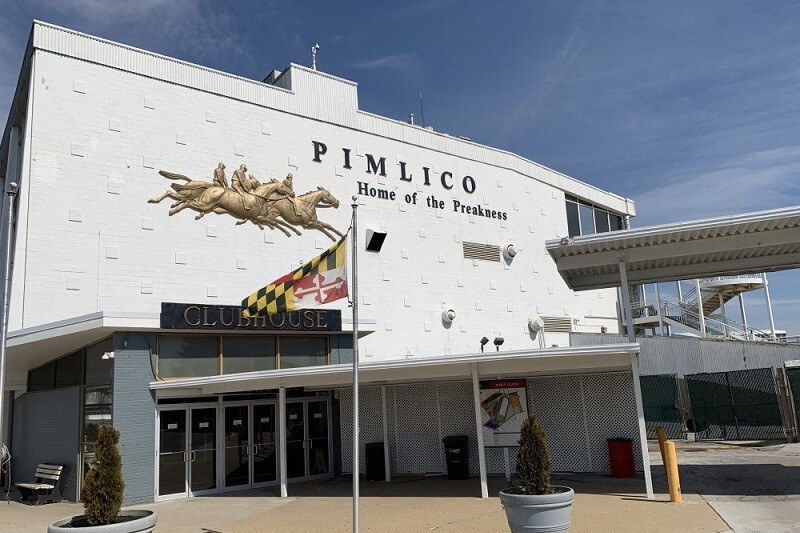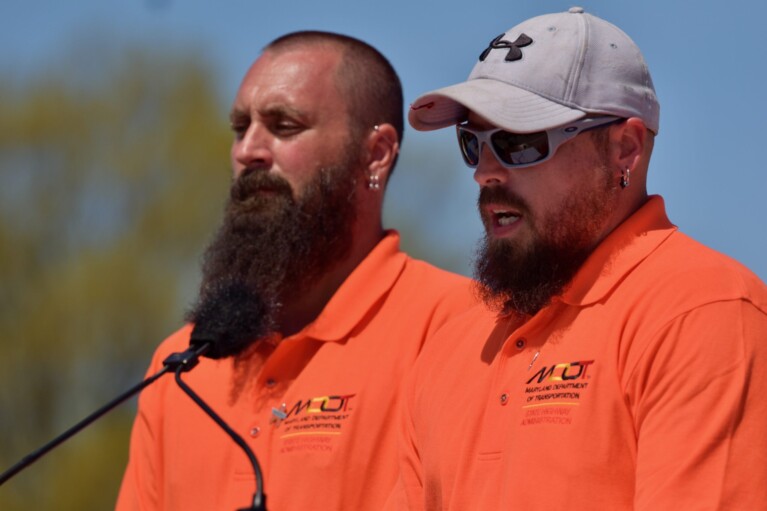Legislature to consider deal that donates Pimlico racetrack to the state

An agreement to redevelop Pimlico Race Course and keep the storied Preakness in Baltimore heads to the General Assembly with less than a month left in the 2024 session.
The bill sponsored by House Ways and Means Chair Vanessa E. Atterbeary (D-Howard) would codify a framework agreement worked out between a nonprofit state racing authority and the Canadian horse racing business that owns Pimlico and rights to the race. As part of that agreement, the Stronach Group will donate the Pimlico racetrack property to be redeveloped into a modernized horse racing facility.
“The Maryland Racing Authority is proud to support this plan that will help secure the future of horse racing here in Maryland,” said Greg Cross, an attorney who heads the authority and led negotiations with the Stronach Group. “We know the state is eager to see the long overdue improvements to Pimlico and investments in the Park Heights community come to fruition, and the governor looks forward to working with the General Assembly to finalize this deal and pass the authorizing legislation to make it a reality.”
House Bill 1524, introduced Thursday, codifies the deal that would lead to a redeveloped Pimlico. The track and a new, yet-to-be-built training facility would be operated by the Maryland Thoroughbred Racetrack Operating Authority.
There is no companion to Atterbeary’s legislation in the Senate.
Senate Budget and Taxation Chair Guy Guzzone (D-Howard) said Thursday the introduction of the House bill was a surprise.
The introduction comes late in the session as the legislature nears “crossover day” on Monday. That’s the deadline for guaranteeing that bills passed in one chamber will be considered in the weeks before the session ends at midnight April 8.
Because of the lateness of the introduction of the bill, it must first go to the House Rules Committee. The legislation is expected to quickly clear that procedural hurdle, allowing for the House Ways and Means Committee to schedule a full hearing.
Guzzone said it is likely the Senate will wait for the House to act before taking up the deal.
“We’ll give it a good look all around,” he said.
While the money set aside for the agreement “doesn’t amount to a lot in the grand scheme of things, in our entire budget, every dollar matters,” Guzzone said.
The bill puts finishing touches on a framework agreement that state leaders announced in January.
Canada-based Stronach Group, which does business as 1/ST and operates here under the Maryland Jockey Club name, agrees to transfer Pimlico to the nonprofit Maryland Thoroughbred Racetrack Operating Authority.
“Since the announcement in early January, which outlined a framework for an agreement in principle between The Stronach Group, The Maryland Jockey Club, and the Maryland Thoroughbred Racetrack Operating Authority, the parties have engaged in extensive negotiations directed at finalizing a comprehensive agreement,” Craig Fravel, executive vice-chairman, 1/ST Racing and Gaming, said in a statement. “That agreement aims to secure a sustainable future for the Maryland Thoroughbred racing industry and ensure the successful operation of Pimlico Racecourse and the Preakness in Baltimore.”
The authority would manage day-to-day horse racing beginning in January. It will also take charge of rebuilding the aging Pimlico facility in Baltimore. The redevelopment, dubbed the “Pimlico Plus Plan” would occur over a three-year period.
The plan relies on $400 million in state bonds. The amount is an increase over the $375 million approved in a 2020 agreement to boost the state’s racing industry that was never consummated. The dramatically re-envisioned site includes modern clubhouses, stables with stalls for 700 horses, a 1,000-seat event space, a 2,000-car parking garage, veterinary facilities, a possible hotel and other new amenities.
The plan also calls for a workforce housing project “in and around the Pimlico racing facility site.” The authority and the Department of Housing and Community Development would work jointly on that plan, according to the bill.
Sen. Jill P. Carter (D-Baltimore City), whose district includes the Pimlico track, said late Thursday she had only been briefed broadly on the latest deal but did not have many details.
“Our whole delegation is extremely concerned about the absence of community engagement and benefits in the deal,” she said. “We want to make sure we’re on par with all the other stakeholders.”
Carter also said she has been surprised by the duration of the Stronach Group’s ability to profit from operations in Maryland.
Carter and three House members who represent District 41 (where the track is located) – Dels. Dalya Attar, Samuel I. Rosenberg, and Malcolm Ruff – have sponsored bills (HB 1416 and SB 618) that would require the Maryland Stadium Authority to create a community development plan for the Pimlico neighborhood and to consult with community leaders.
A hearing on Carter’s bill was canceled by the Budget and Taxation Committee. The delegates’ bill has yet to be scheduled for a hearing.
Carter said the District 41 lawmakers hope that elements of their bill will be incorporated into the new legislation.
“This bill does say that the racetrack authority and the state Housing Department will consult about building housing for racetrack employees, people who work on the backstretch, who are now staying in pretty shabby housing on track next to the stables,” Rosenberg said. “And we feel, myself and my 41st district colleagues, feel it’s very important to continue the investment in the surrounding neighborhoods.”
Rosenberg mentioned the Belvedere area near the track as one in need of revitalization.
“There are also plans on the financing to build, to do some significant redevelopment on Belvedere, which is on the south side of the track,” he said. “And everyone who comes to Pimlico sees Belvedere Avenue. Whether you drive onto the track that way, walk there, or see it from the stands. That corridor needs improvements, and this is going to start that process, this bill.”
What’s in it for Stronach
In the deal, the Stronach Group retains ownership of the Preakness and Black-Eyed Susan Stakes. The group would license the races to the state authority.
The Stronach Group would also retain ownership of Laurel Park, a thoroughbred racetrack just outside the City of Laurel. It is widely assumed that the track will no longer be used for horse racing, but the ultimate disposition of the property is unknown.
Sen. Jim Rosapepe (D-Prince George’s and Anne Arundel), whose district includes the City of Laurel and until recently included Laurel Park racetrack, said his constituents are understandably uneasy about what will happen next at the property and are especially worried about traffic and congestion, especially if Laurel Park is sold to developers.
“There’s always a question when you have a redevelopment, especially of a big property like the Laurel racetrack, what’s it going to be and what going to be the impact on the rest of the community?” he said.
The deal keeps the Preakness, the second jewel in horse racing’s Triple Crown, in Baltimore with the exception of a one-year hiatus.
The race would be run at Pimlico as usual this year and in 2025. The following year, the race would be run at Laurel Park, marking the first time since 1908 that the race was not held at Pimlico.
The race would return to Baltimore in 2027, under the plan.
Rebuilding Pimlico would support 140 to 160 racing days at the site a year.
The plan also calls for the state a modern training facility. A report released by the authority in January recommended three sites: the existing Bowie Racecourse Training Center, which Stronach owns; Mitchell Farm in Harford County, and Shamrock Farm, which is about 20 minutes from Pimlico in Baltimore County.
The bill proposed in the House sets aside $110 million of the $400 million in bonds for construction of the training facility.
Danielle J. Brown contributed to this report.





 Creative Commons Attribution
Creative Commons Attribution